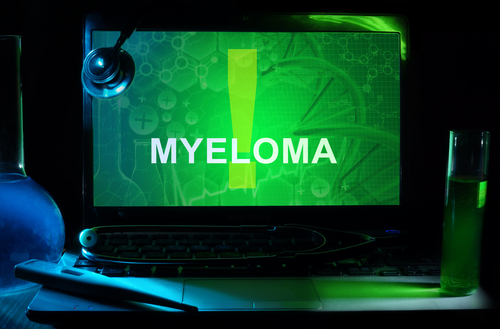Takeda Publishes Promising Trial Results on Ixazomib, an Approved Drug to Treat Relapsed Multiple Myeloma

Takeda Pharmaceutical has published promising data from the TOURMALINE-MM1 Phase 3 clinical trial of patients with relapsed and/or refractory multiple myeloma (MM), treated with the combination of once-weekly oral Ninlaro (ixazomib) capsules and lenalidomide-dexamethasone or placebo and lenalidomide-dexamethasone.
The results, also presented at the 57th Annual Meeting of the American Society of Hematology (ASH) in Orlando, Florida, were published in the New England Journal of Medicine (NEJM).
MM is a cancer in which abnormal plasma cells build in the bone marrow, interfering with the formation of normal blood cells. Patients with MM are commonly treated with chemotherapy based on lenalidomide and dexamethasone (a type of corticosteroid). But post-treatment relapses are common, and new therapeutic approaches needed.
Ninlaro is an oral drug formulated to inhibit the breakdown of protein complexes called proteasome to maintain their function in fighting the cancer cells. Based on results from the TOURMALINE-MM1 study, the drug was approved in late 2015 by the U.S. Food and Drug Administration (FDA) to be used in combination with lenalidomide-dexamethasone as a therapy for MM patients who have been treated at least once.
“NEJM has published the results of the first Phase 3 study supporting an all-oral triplet regimen containing a proteasome inhibitor in multiple myeloma. With the emergence of long-term treatment as a preferred approach for multiple myeloma, it is crucial that we investigate more ways to improve treatment sustainability for patients,” said Philippe Moreau, MD, University of Nantes, France, and the study’s co-author and lead investigator, in the press release.“The TOURMALINE-MM1 results demonstrated that ixazomib in combination with lenalidomide and dexamethasone is an effective and tolerable oral regimen with a manageable safety profile for patients with relapsed and/or refractory multiple myeloma.”
A total of 722 patients participated in the TOURMALINE-MM1 first Phase 3 trial. Results showed a significant improvement (35%) in the progression-free survival (PFS) of the ixazomib group, even in patients with poor prognosis (average PFS: 20.6 months vs. 14.7 months in the control group; median follow-up 14.7 months).
The overall response rates in the ixazomib and placebo groups were 78% versus 72%, with very good partial response rates of 48% versus 39%. An average response time of (1.1 versus 1.9 months) and duration of response of (20.5 versus 15.0 months) were recorded for both the ixazomib and placebo group, respectively.
Serious side events were (47% versus 49%) and on-study deaths were (4% versus 6%) for the ixazomib and placebo group, respectively. Also, a total of 74% of MM patients on ixazomib and 69% on placebo experienced grade ≥3 side effects, where grade 3 and 4 thrombocytopenia were more common in the ixazomib (12% and 7%) compared to the placebo group (5% and 4%).
Other side effects, such as rash, were more common among ixazomib than placebo patients (36% versus 23%), and incidents related to gastrointestinal were mostly low grade. Furthermore, an average of 27% versus 22% of patients on ixazomib and placebo, respectively, experienced peripheral neuropathy adverse effects.
“The publication of the Phase 3 TOURMALINE-MM1 trial results is another important milestone for patients and physicians. This reflects invaluable efforts from our researchers, the study investigators, the patients and their families,” said Dixie-Lee Esseltine, MD, FRCPC, vice president, Oncology Clinical Research, Takeda. “The publication concluded that the addition of ixazomib to lenalidomide and dexamethasone was associated with significantly longer progression-free survival; the additional toxic effects with this all-oral regimen were limited. We look forward to sharing additional ixazomib data from our ongoing TOURMALINE studies over the next few years.”
Currently, Ninlaro is being reviewed by the European Medicines Agency (EMA) for use in Europe, and Takeda has also applied for its approval to health authorities in several other countries.






